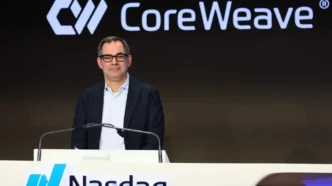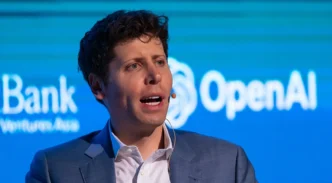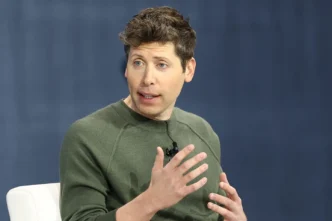CoreWeave began trading on Friday with a subdued market response, pricing its shares at $40—below the initially proposed $47-$50 range. The company also reduced the number of shares offered. Ultimately raising $1.5 billion and securing a $14 billion market capitalization on its first day. This fell short of its earlier ambition to raise over $3 billion with a significantly higher valuation. Shares opened at $39 and closed at $40, signaling a lukewarm investor reception.
Despite the underwhelming debut, CoreWeave’s IPO stands as the largest AI-related public offering to date and the most significant U.S. tech IPO since 2021.
Chief Strategy Officer Brian Venturo, speaking from a plain conference room in a casual white hoodie, reflected on the company’s unconventional journey. CoreWeave’s origins trace back to a group of hedge fund managers who pivoted to crypto mining after their previous venture, Hudson Ridge, wound down during the U.S. fracking boom.
Venturo, alongside CoreWeave co-founders Michael Intrator and Brannin McBee, initially used machine learning models to analyze energy investments. When that chapter closed, they shifted focus to cryptocurrency mining, starting with a single GPU in their Manhattan office. One quickly became ten, then a thousand, and soon they were operating tens of thousands of GPUs out of a warehouse.
At their peak, CoreWeave was the world’s largest Ethereum miner, running 50,000 Nvidia consumer GPUs—originally designed for gaming—under extreme conditions. This experience led them to develop advanced automation and monitoring systems to maintain hardware reliability.
Recognizing the broader potential of their GPU infrastructure, the team explored AI training but needed expertise. They found it through EleutherAI, an open-source AI research group. In exchange for access to CoreWeave’s hardware, EleutherAI provided insight into AI training workflows, helping the company refine its strategy.
What began as a learning opportunity quickly turned into a business breakthrough. AI startups connected to EleutherAI became CoreWeave’s first paying customers. Stability AI followed suit, and the company secured a major investment from Magnetar Capital after a dinner pitch where Venturo passionately argued for the future of AI.
CoreWeave’s growing reputation in the open-source AI community attracted OpenAI’s attention, leading to a partnership. Microsoft, OpenAI’s primary cloud provider and investor, soon became CoreWeave’s biggest customer. However, OpenAI recently signed a $12 billion deal directly with CoreWeave, overtaking Microsoft in significance.
Today, CoreWeave operates 32 data centers and manages 250,000 GPUs, including Nvidia’s sought-after Blackwell chips for AI applications. However, concerns loom over its financial structure. The company carries $7.6 billion in debt—much of it maturing within two years—against $1.9 billion in revenue, even with $15 billion in contracted commitments.
Venturo insists that each client deal is structured to offset the debt incurred from GPU purchases. Regardless of investor concerns, CoreWeave’s founders recognize their improbable rise—from hedge fund veterans and crypto miners to leaders in AI infrastructure.
“There were so many lucky breaks along the way—it’s crazy,” Venturo admitted.













